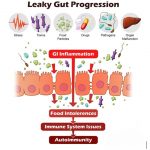The Ultimate Wrinkle Stroking Molecule! Simple Things You Can Do To Leverage Collagen Benefits
Collagen benefits for the human body are truly endless. You might recognize it as an ingredient in your favourite body lotion. Or perhaps you’ve noticed supplements in the vitamin aisle that feature it. But what is collagen, exactly — and how can you incorporate it into your life?
Collagen is the most abundant protein in your body. It’s found in muscles, bones, skin, blood vessels, digestive system and tendons.
It’s what helps give our skin strength and elasticity, along with replacing dead skin cells. When it comes to our joints and tendons, in simplest terms, it’s the “glue” that helps hold the body together.
Our body’s collagen production naturally begins to slow down as we age. We can thank this degenerative process for signs of aging. This include wrinkles, sagging skin and joint pains due to weaker or decreased cartilage (hello, skeleton legs).
Other lifestyle factors —
Like Eating A Diet High In Sugar, Smoking And High Amounts Of Sun Exposure — Also Contribute To Depleting Collagen Levels
It’s been found that collagen-related diseases most commonly arise from a combination of either genetic defects, poor intake of collagen-rich foods, nutritional deficiencies and digestive problems affecting production (synthesis) of collagen.
Thankfully, consuming a little known but yummy food can provide plenty of this vital protein. And if you’re wondering what is collagen good for, I’m glad you asked.
Top 7 Collagen Benefits
#7 Improves Health of Skin and Hair

As we age, collagen production declines — it’s happening as you read this! You’ll notice it physically: looser skin, more wrinkles and less elasticity.
Increasing collagen levels can help your skin look firmer, increase smoothness. It can also help your skin cells keep renewing and repairing normally.
Double-blind, placebo-controlled studies investigating the anti-aging properties of collagen have found that 2.5–5 grams of collagen used among women aged 35–55 once daily for eight weeks significantly improved skin elasticity, skin moisture, trans epidermal water loss (dryness) and skin roughness, all with little to no side effects.
This Makes Collagen One Of The Best Natural Skin Care Ingredients Available
One of the key collagen benefits is that it also reduces cellulite and stretch marks. When skin loses its elasticity as a result of decreased collagen, there’s another side effect: more visible cellulite.
Because your skin is now thinner, cellulite becomes more evident — no more hiding what’s happening below the surface.
Improving your skin’s elasticity through collagen helps reduce that dimpling on your skin.
#6 Reduces Joint Pains and Degeneration

Have you ever felt like you’ve got “skeleton legs,” the types that feel extra stiff and cause pain when you move? Yup, that’s likely a loss of collagen rearing its ugly head.
That’s because when we lose collagen, our tendons and ligaments start moving with less ease, leading to stiffness, swollen joints and more.
With its gel-like, smooth structure that covers and holds our bones together, collagen allows us to glide and move without pain.
Think Of Ingesting More Collagen Like Greasing A Creaky Door Hinge:
It helps your joints move more easily, reduces pain often associated with aging and even reduces the risk of joint deterioration.
It’s no surprise then that a recent study even found that collagen is an effective treatment for treating osteoarthritis and other joint pain and disorders.
Researchers at Harvard’s Beth Israel Deaconess Medical Centre in Boston found that supplementing with type 2 collagen helped patients suffering from rheumatoid arthritis find relief from painful symptoms by decreasing swelling in tender joints.
Another study published in the International Journal of Medical Sciences found that people with osteoarthritis joint pain treated with type 2 collagen show significant enhancements in daily activities, such as walking up stairs, ascending or sleeping, and a general improvement in their quality of life.
#5 Helps Heal Leaky Gut

If you suffer from leaky gut syndrome, a condition where bad-for-you toxins are able to pass through your digestive tract, collagen can be super-helpful.
It helps break down proteins and soothes your gut’s lining, healing damaged cell walls and infusing it with healing amino acids.
The biggest digestive benefit of consuming more collagen is that it helps form connective tissue and therefore “seals and heals” the protective lining of the gastrointestinal tract.
Today, We Know That Many Illnesses Can Actually Be Traced Back To Inflammation Or Irritation Stemming From An Unhealthy Gut.
Poor gut health — including changes in the gut micro biome and permeability in the gut lining — allows particles to pass into the bloodstream where they can kick off an inflammatory cascade (hence the name leaky gut syndrome).
Studies have found that in patients with inflammatory bowel disease, serum concentrations of collagen are decreased.
Because the amino acids in collagen build the tissue that lines the colon and GI tract, supplementing with collagen can help treat gastrointestinal symptoms and disorders.
This includes leaky gut syndrome, IBS, acid reflux, Crohn’s disease and ulcerative colitis.
In addition to helping heal leaky gut, collagen also helps with the absorption of water within the intestines, keeping things moving more freely out of body.
#4 Boosts Metabolism, Muscle Mass and Energy Output

A boost in collagen may help increase your metabolism by adding lean muscle mass to your frame and helping with the conversion of essential nutrients.
One of glycine’s most important roles is helping form muscle tissue by converting glucose into energy that feeds muscle cells.
And remember that retaining muscle mass is crucial as you age, since it helps support posture, bone health and burns more calories than fat.
When consuming collagen, you can benefit from also consuming vitamin C to ensure your body can convert the collagen into a usable protein. This can begin to restore the source or your energy and vitality.
That’s Not All That Glycine Can Do For Your Metabolism
Research shows glycine also has important roles in both functions of the digestive and central nervous systems, which play big roles in maintaining a healthy, youthful body.
Glycine seems to help slow the effects of aging by improving the body’s use of antioxidants and is also used in the process of constructing healthy cells from DNA and RNA.
#3 Strengthens Nails, Hair and Teeth

Ever had peeling and splitting nails? Well, a lack of collagen could be to blame. Collagen protein is the building block of your fingernails, hair and teeth.
Adding collagen into your diet regimen can help keep your nails strong and possibly reverse signs of hair loss.
A study published in the Journal of Investigative Dermatology found that there’s an “essential relationships between extracellular matrix (ECM) and hair follicle regeneration. This would suggest that collagen could be a potential therapeutic target for hair loss and other skin-related diseases.”
#2 Improves Liver Health

If you’re looking to detox your body of harmful substances, improve blood flow and keep your heart young, collagen is extremely helpful.
That’s because glycine helps minimize damage your liver experiences when it absorbs foreign substances, toxins or alcohol that shouldn’t be passing through it.
#1 Protects Cardiovascular Health

The amino acid proline helps your artery walls release fat buildup in the bloodstream, shrinking the fat in the arteries and minimizing fat accumulation.
Proline is needed for tissue repair within the joints and arteries, plus it helps control blood pressure.
As part of collagen found within joints…
It Buffers Our Bodies From The Effects Of Vibration Or Shock
…and helps us hold on to valuable cartilage as we get older. This is one of the most remarkable collagen benefits.
It’s also linked with the prevention of arteriosclerosis (hardening of the arteries) since it helps our arteries stay clear of dangerous plaque buildup.
In addition, arginine helps with nitric oxide production, which allows for better vasodilation.
This means the widening of arteries and relaxation of muscle cells and blood vessels that allows for better circulation.
What Is Collagen? Collagen Benefits And Its Nutrition Facts
Just how healthy is collagen (and other related proteins like gelatine) for you, really? Very!
Collagen is often referred to as a “complex protein,” which is not surprising considering it contains a whopping 19 different amino acids. These include a mix of both nonessential (also called conditional) and essential types.
Collagen is a particularly great way to get more conditional amino acids, like arginine, glutamine, glycine and proline.
Collagen is composed of three chains, wound together in a tight triple helix.
Each Chain Is Over 1,400 Amino Acids Long!
Proline and glycine are the primary types of amino acids that make up collagen chains. Both proline and glycine are two important amino acids that aren’t abundant in animal meats.
Most people eating a “Western diet” get the majority of their protein from them.
This means that people are lacking these amino acids in their diets. Since they regularly avoid eating some of the best natural sources (like organ meats).
For reasons you’ll see below, “nonessential” amino acids are actually pretty darn important — so don’t let the name fool you! Under normal circumstances your body produces them.
However, when you’re sick, under a lot of physical or emotional stress, or otherwise unhealthy, your body may not be able to produce enough of these amino acids on its own.
The Body Then Needs Help From Outside Sources, Mainly Your Diet Or Supplements, To Get Its Fill.
The highest percentages of amino acids found within collagen, along with some of their key benefits, include:
Proline:
And here’s proline that makes up almost 15 percent of collagen. Proline and glycine, in particular, play a major role in ensuring your body’s running smoothly.
Proline helps protect integrity of blood vessels, improve joint health and has various cardiovascular benefits.
Glycine:
Around one-third of the protein found in collagen is glycine. While size-wise it’s the smallest amino acid, glycine has big effects.
To ensure our cells function properly, glycine helps build healthy DNA strands. It’s also one of three amino acids that form creatine. This protein promotes healthy muscle growth and boosts energy production during workouts.
Glutamine:
So, glutamine comes from our muscles and also from food sources. It is by all means one of the most important and abundant amino acids in the body
Research shows that glutamine has benefits for preventing anxiety, tension, sleep disorders/insomnia, a lack of concentration, poor digestive health, a weakened immune system and low energy.
According to a report printed the American Journal of Clinical Nutrition, it’s been shown to have positive effects of production of growth hormone.
Moreover this can improve aspects of mental health. For instance helping with release of GABA that boosts feelings of “inner calm and tranquility.”
Nitrogen, created by glutamine in high amounts, also helps with wound healing and prevents muscle wasting and joint pains.
Arginine:
This amino acid named Arginine (also commonly called L-arginine) breaks down into nitric oxide within the body. This is an important compound for arterial and heart health.
Arginine also improves circulation, helps strengthen the immune system and has a positive influence on male libido.
Getting Collagen Benefits Into Your Life
Our ancestors chowed down on quite a bit of collagen as a natural way of life. This is since earlier traditional diets incorporated whole-animal eating.
Simply put, they ate many animal parts, like skin, tendons and ligaments that we now commonly avoid or discard.
The healthiest, easiest, tastiest, safest, most affordable, and most effective way to enjoy a therapeutic dose of the purest form of collagen is by enjoying bone broths once per day.
It’s the only instant natural way to ENJOY eating one of the purest and best absorbed sources of collagen in your body.
To be clear, you could also take collagen supplements, but I do not recommend them.
The supplement industry is unregulated, so it is unlikely that what you buy is what the label claims.
Also, why force yourself to take a bunch of pills or yucky powders when you could be eating delicious — and more affordable — food instead?!
Final Thoughts on Collagen Benefits
It’s important to note that there are many factors that support the formation and use of collagen in the body. Among them are vitamin C, manganese, copper, proline and foods high in anthocyanidins (such as blueberries, cherries and blackberries).
You always want to eat collagen in whole food form along with other whole foods. This is the only way to activate collagen in the body
Additionally, while many creams and powders claim to revitalize skin by adding collagen.
The molecules in these topical products are usually too large for your skin to actually absorb.
In contrast, with the home made bone broth, you’ll deliciously, affordably, and naturally improve your body from the inside out.
In other words, you can save your money when it comes to slathering collagen directly onto your skin.
Lastly, I genuinely hope you will give yourself the gift of the purest, easiest, and most delicious whole-food source of collagen available.
I enjoy a batch of bone broth nearly EVERY day (except for when I travel). And I always recommend that everyone in my family does the same.
I look forward to hearing from you soon!